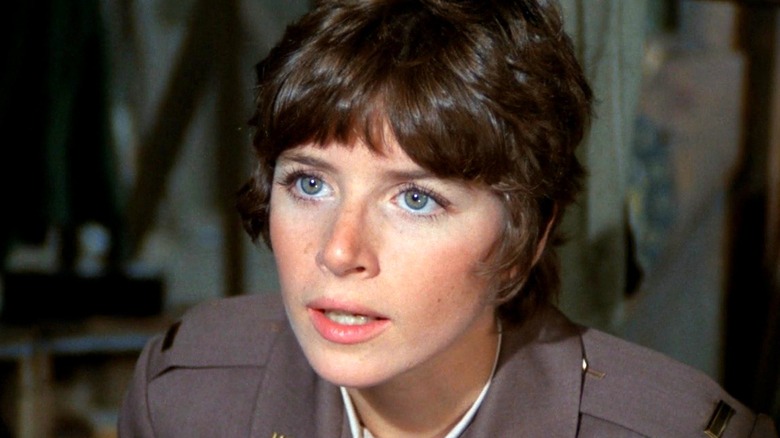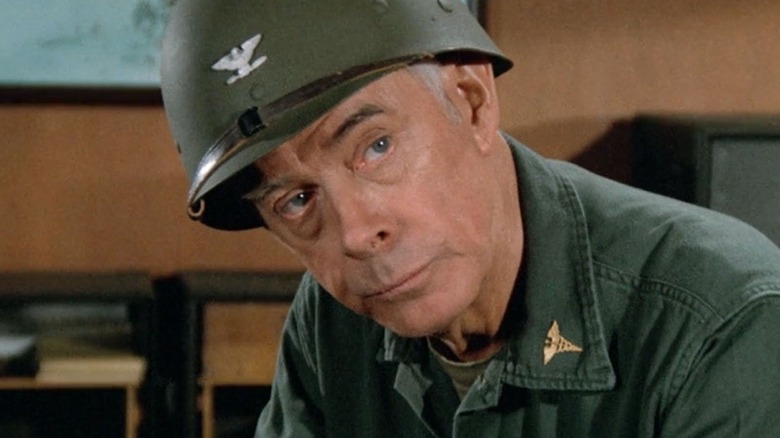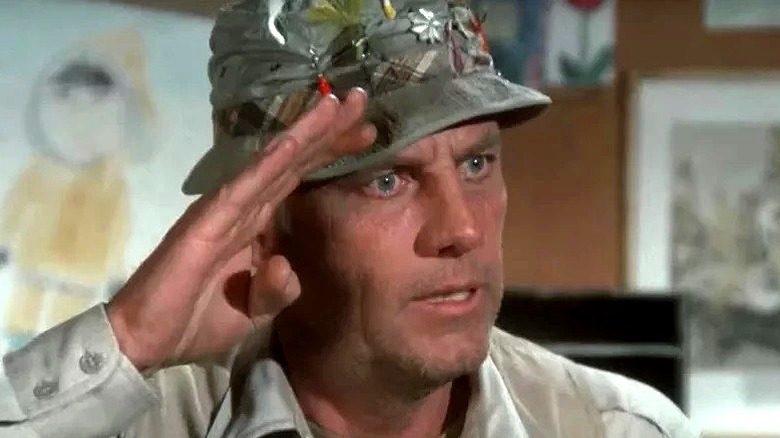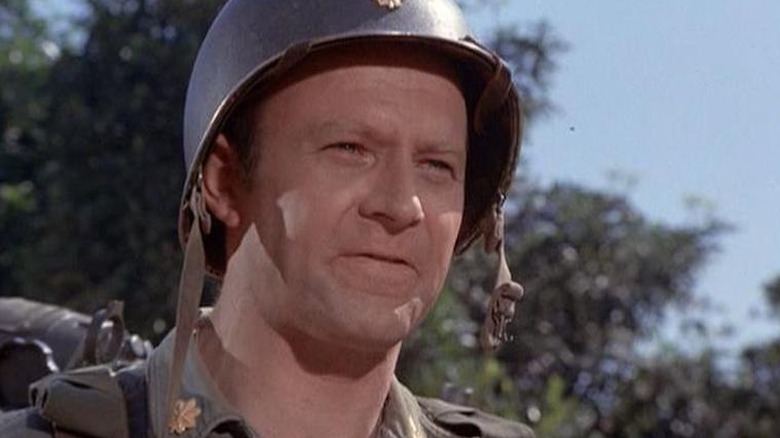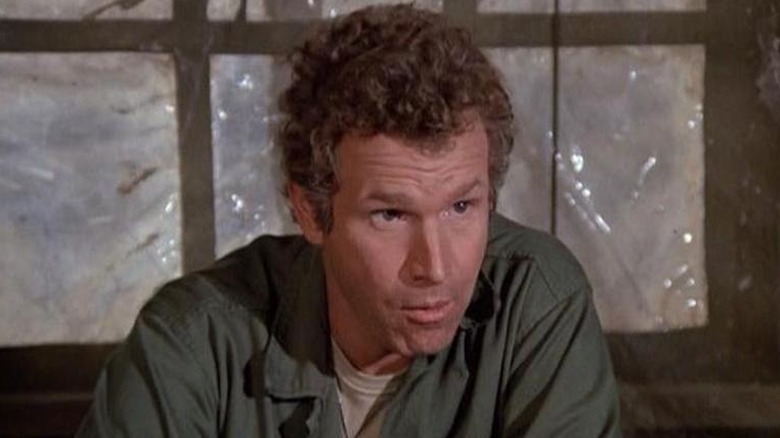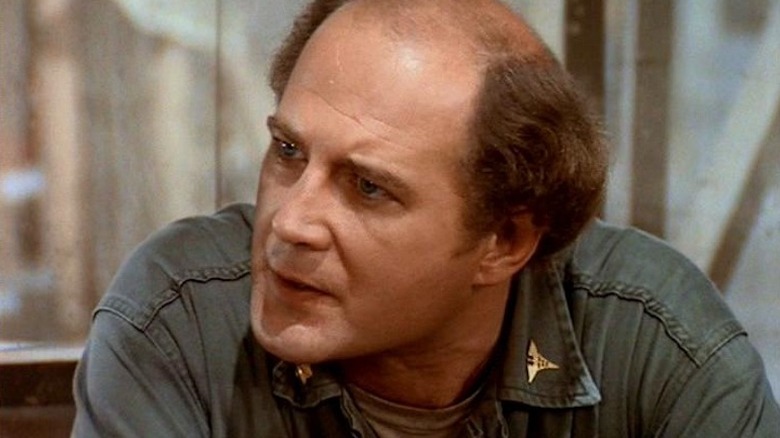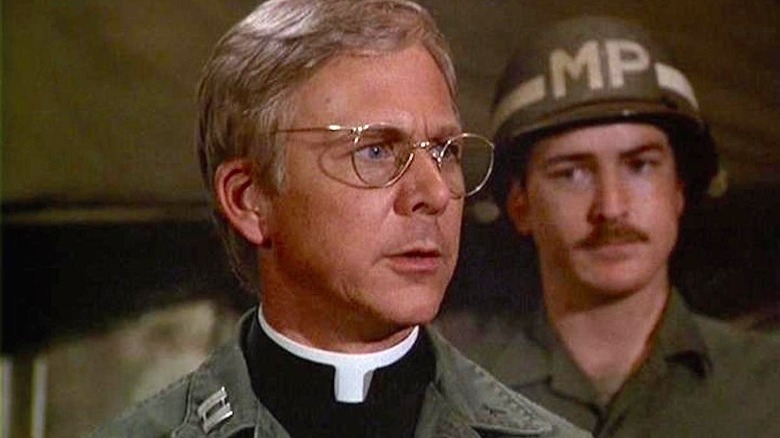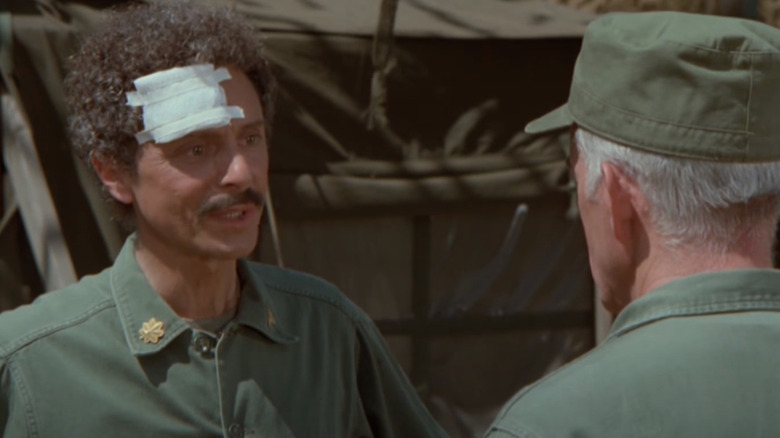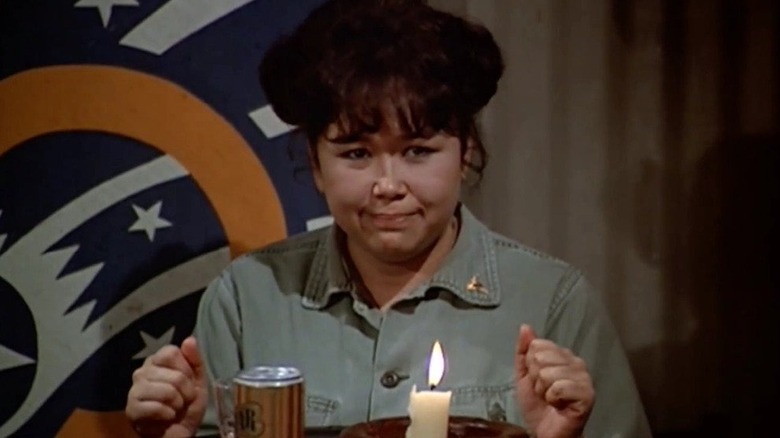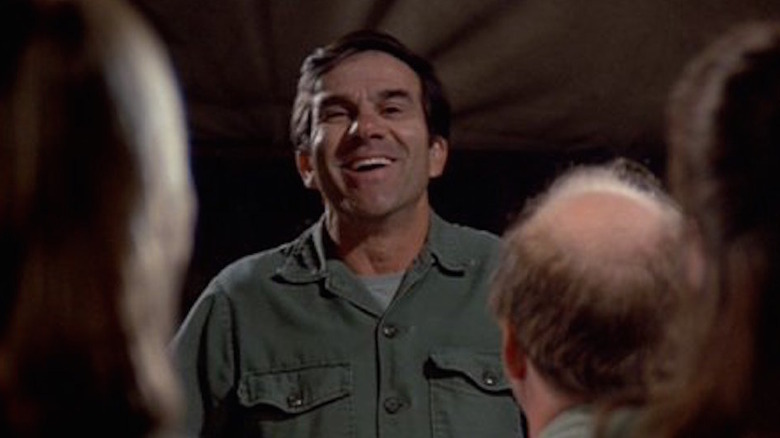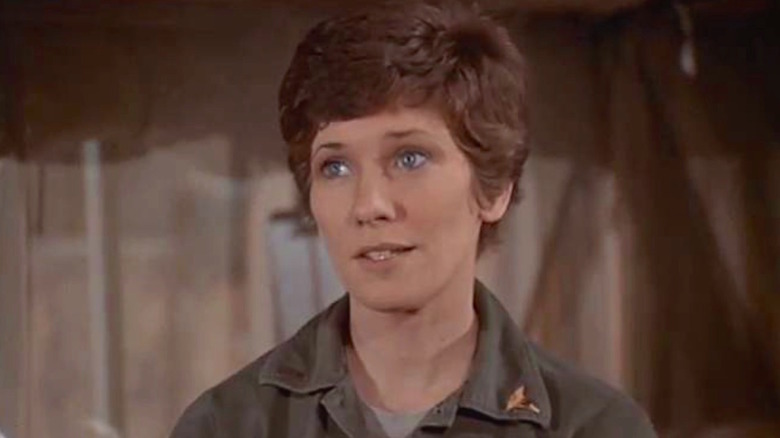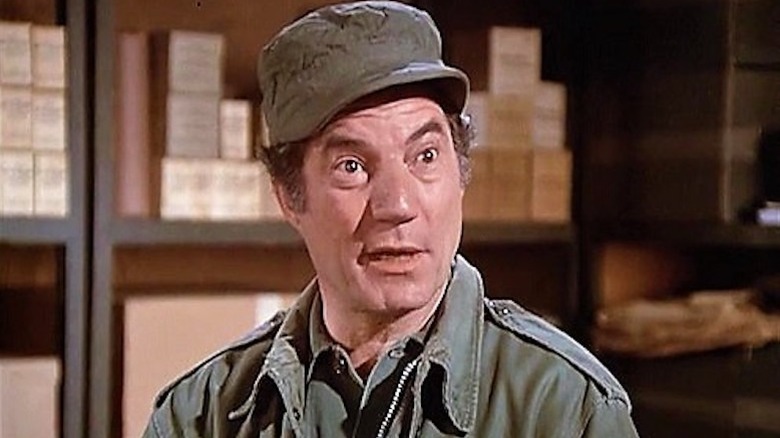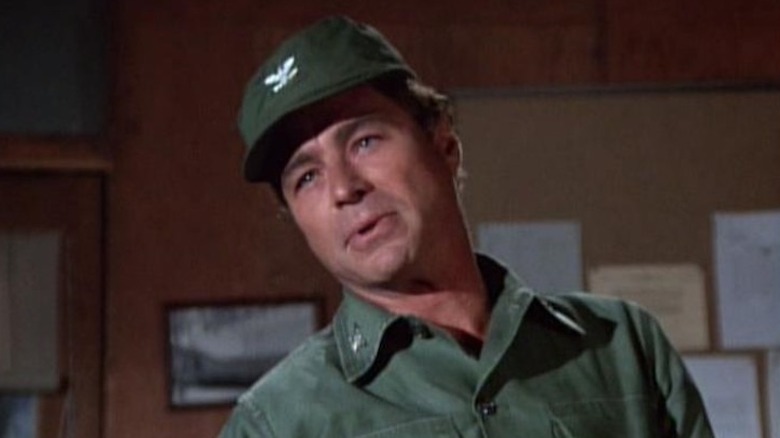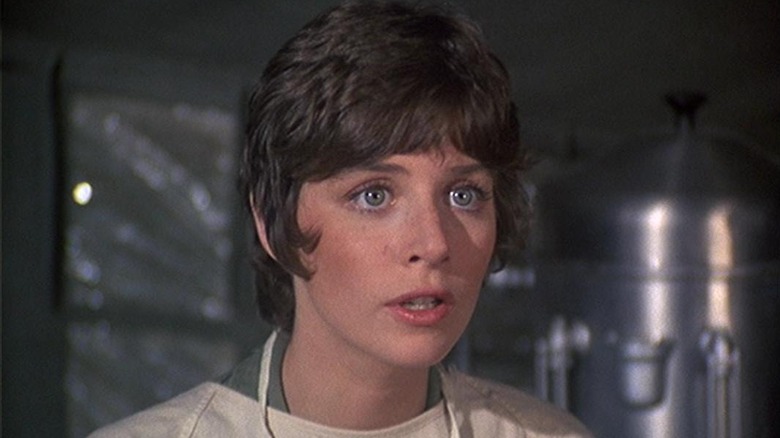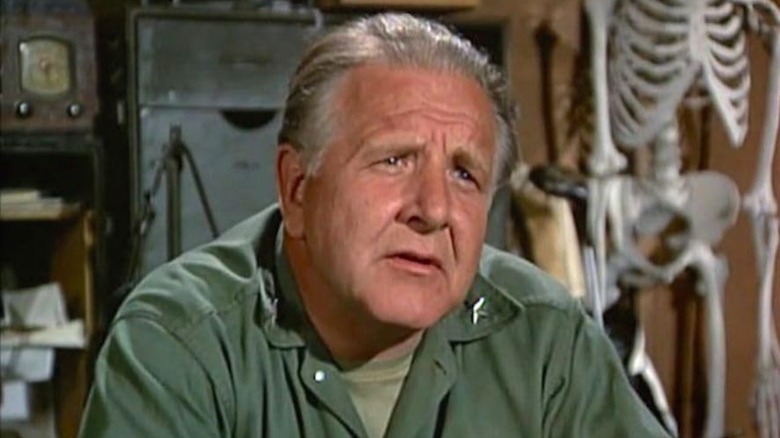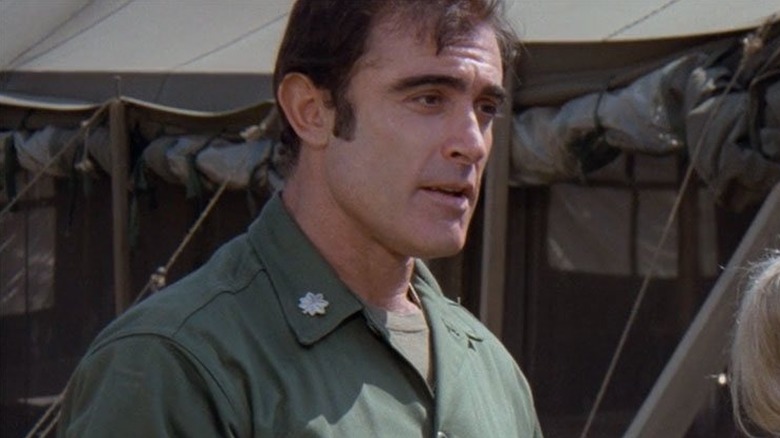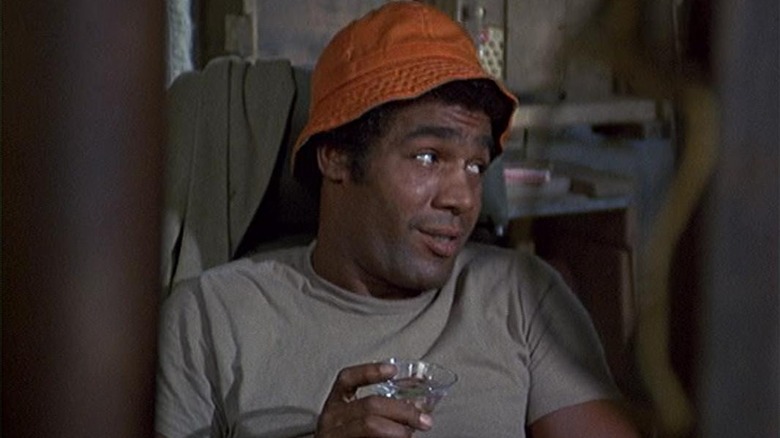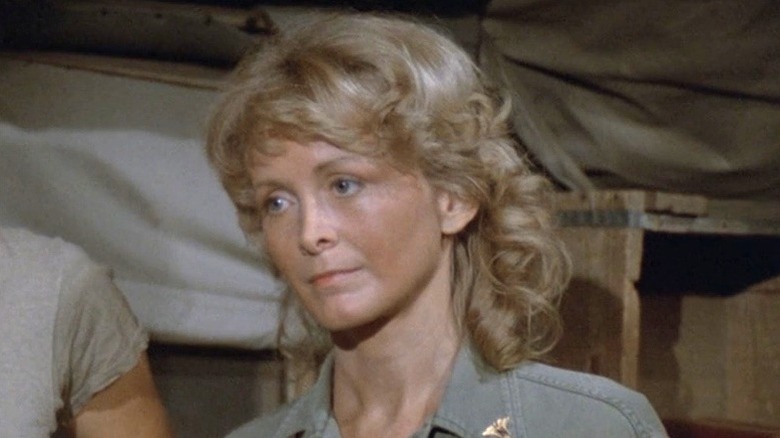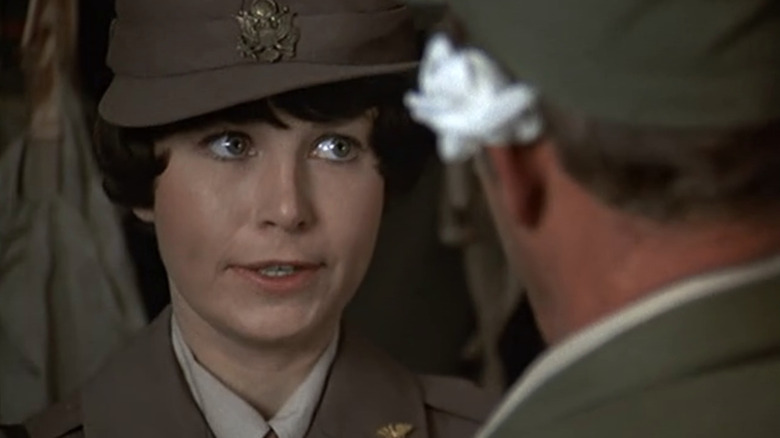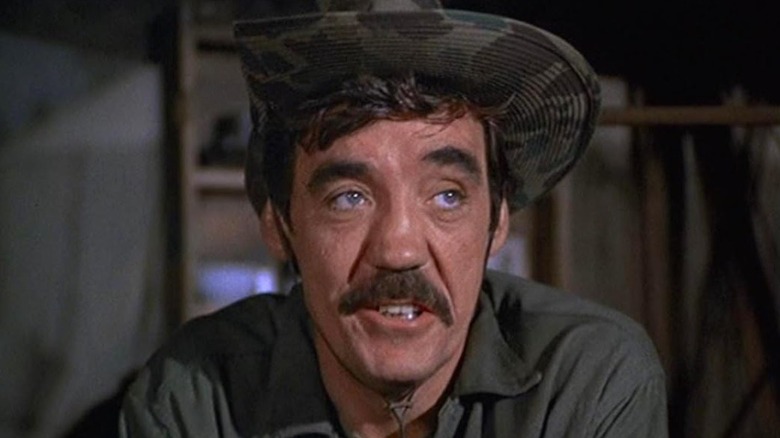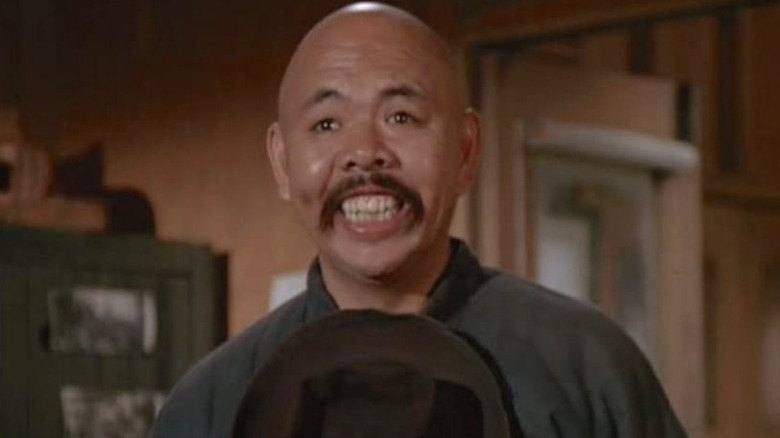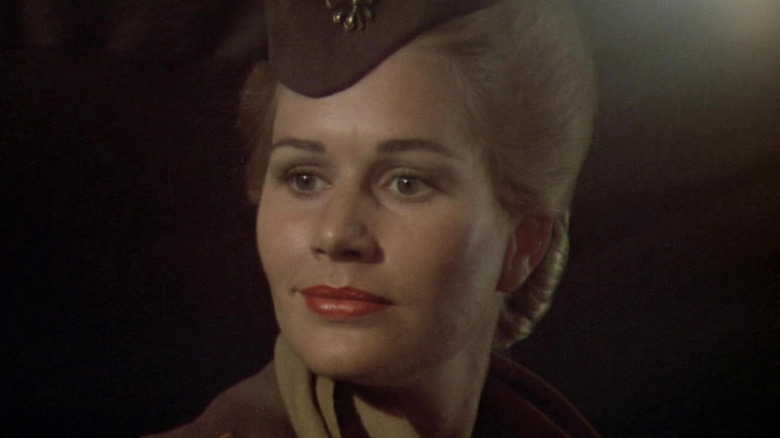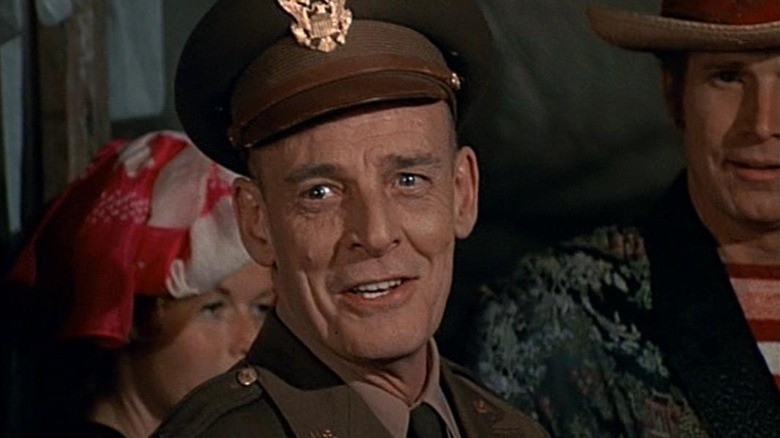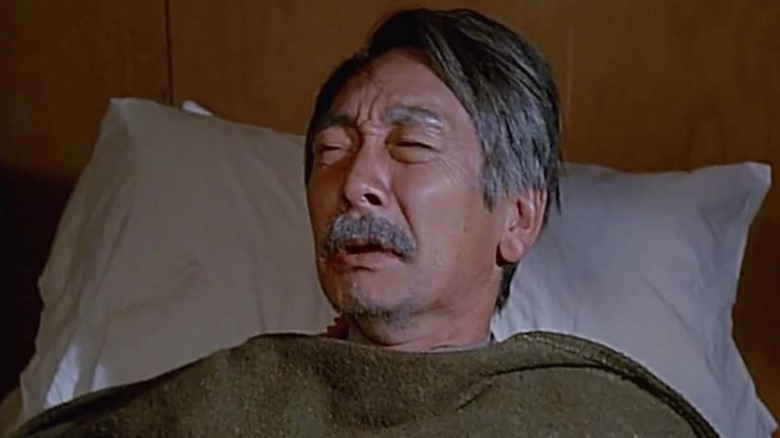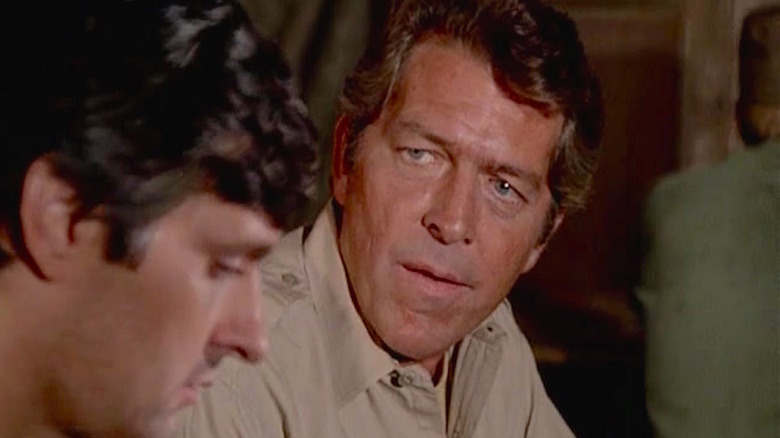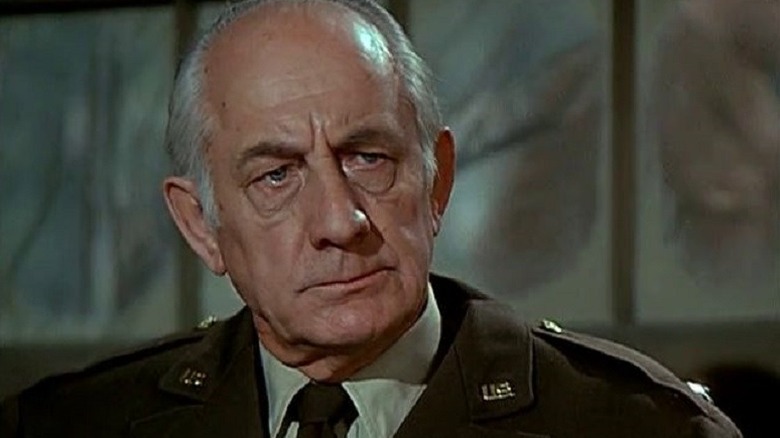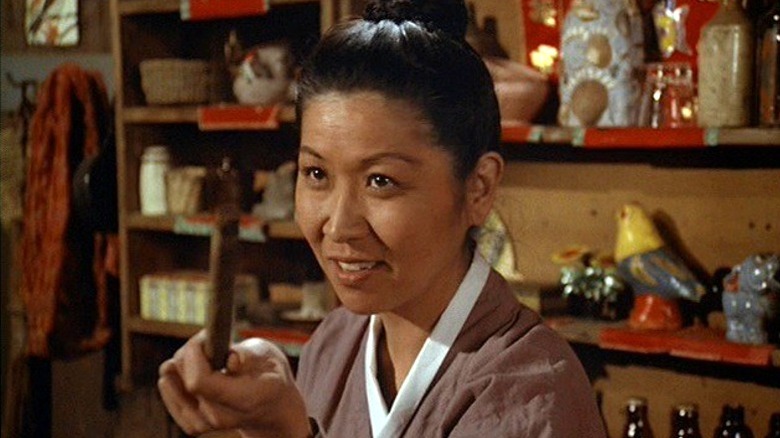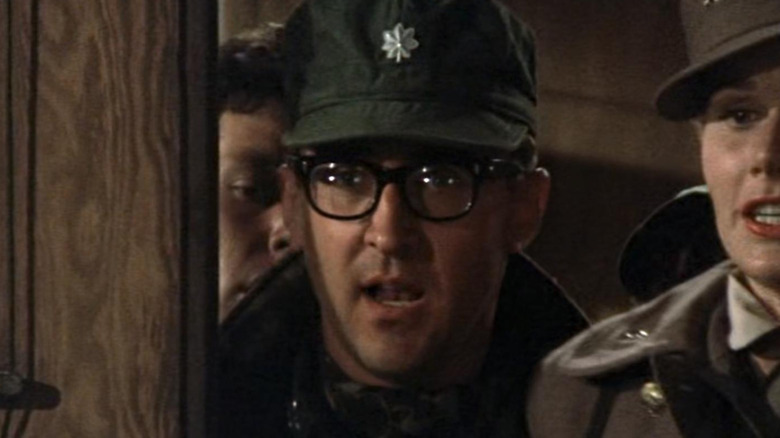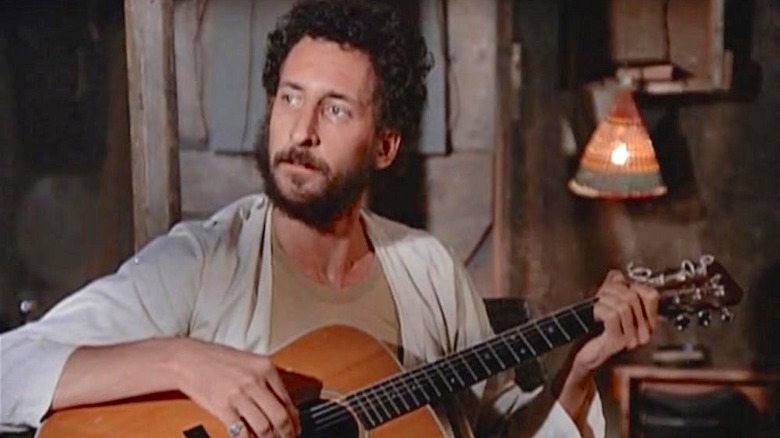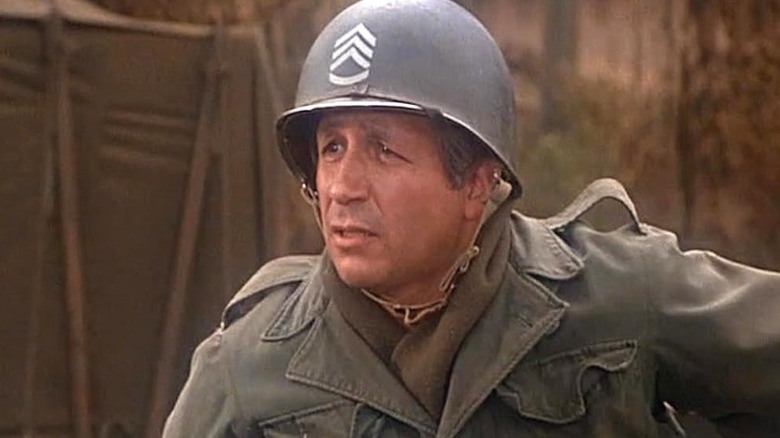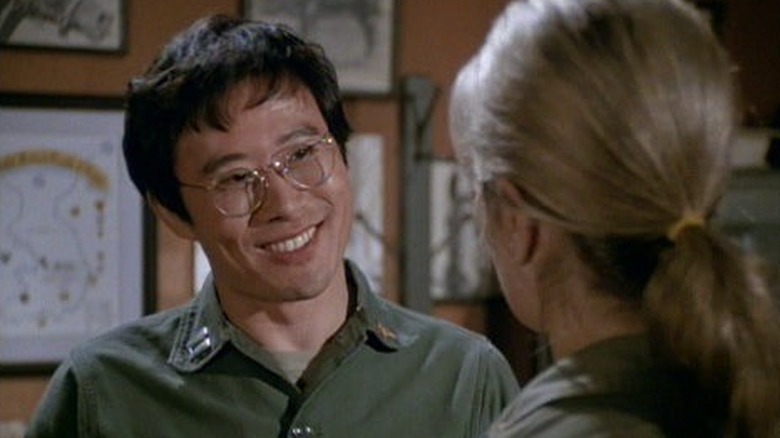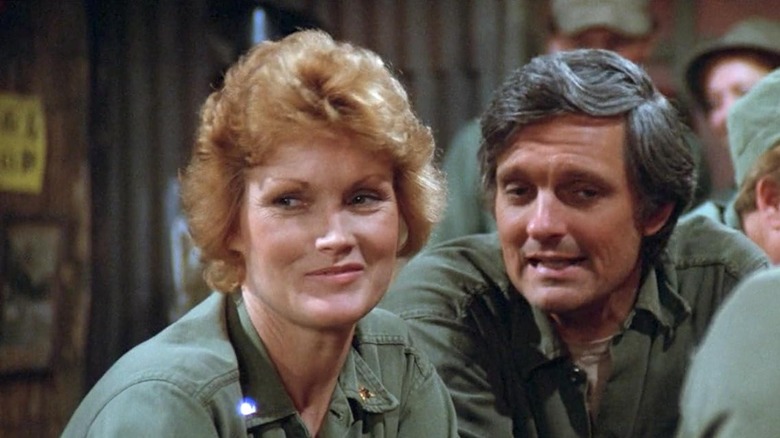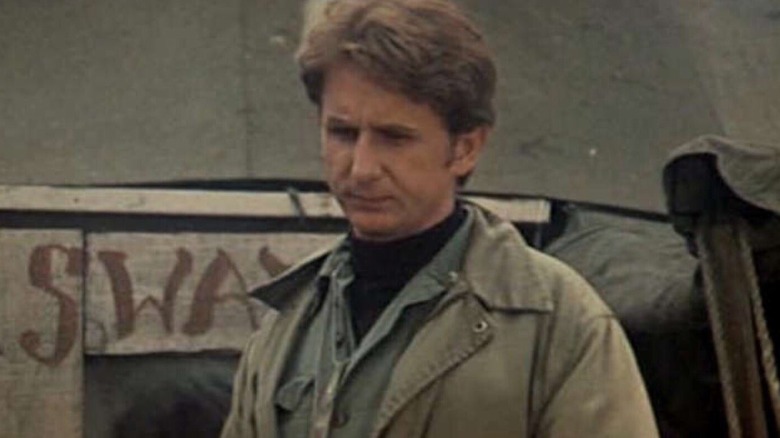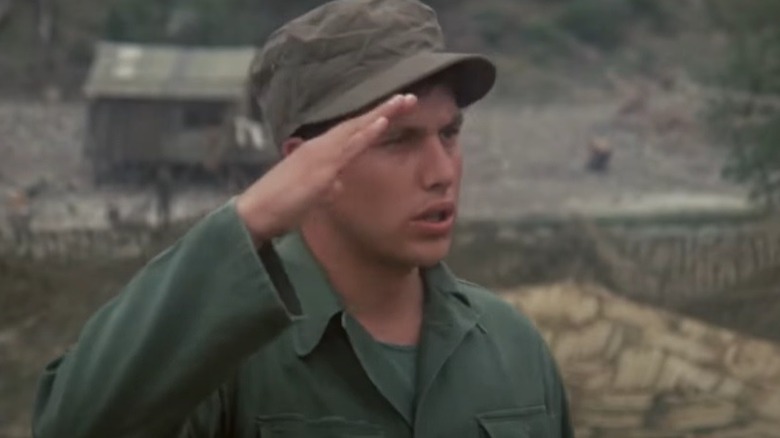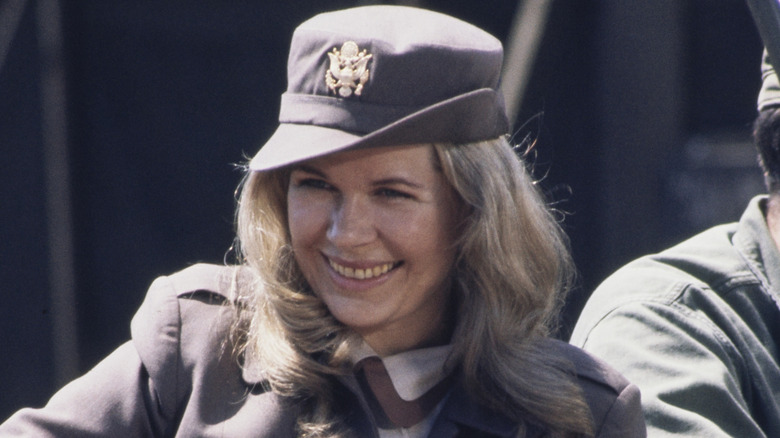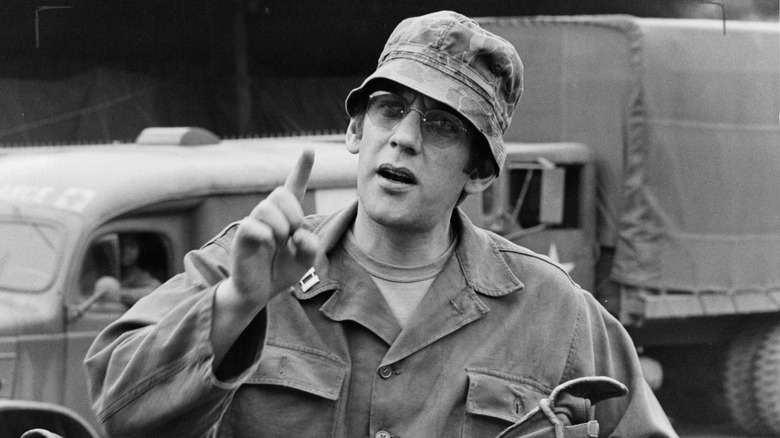M*A*S*H Actors Who Sadly Passed Away
From 1972 to 1983, "M*A*S*H" ruled the airwaves as a cultural phenomenon. The finale alone was the single most-watched U.S. TV broadcast of all time. It could be one of the funniest things on TV, but it was also capable of being one of the most emotionally devastating shows on the air. On the other hand, the 1970 movie that the show is loosely adapted from (with both being inspired by Richard Hooker's 1968 book "MASH: A Novel About Three Army Doctors") is a comedy through and through, albeit a very dark one — its R rating allowed it to go places the TV show never got near.
A number of "M*A*SH" stars are still around today, and some of them are actually still working in Hollywood. However, the inevitable passing of time means that several beloved cast members of both the movie and the TV show are now gone. We wanted to commemorate the "M*A*S*H" actors who are no longer with us and let you know what became of them after their time at the 4077th Mobile Army Surgical Hospital came to an end.
Harry Morgan (Sherman Potter)
Before he was cast as the fatherly, folksy Colonel Sherman Potter, Harry Morgan turned up on the "M*A*S*H" TV show as the unhinged one-off character General Steele in "The General Flipped at Dawn," one of the show's top comedic episodes. The show had to bring him back, as Jamie Farr once explained, because Harry Morgan was probably the single funniest person in the whole cast. He'd go on to become one of the most endearing, too, with his steady presence as Colonel Potter anchoring the other characters from Season 4 all the way to the finale.
Morgan had a long career, but his work on "M*A*S*H" always held a special place in his heart. According to Reuters, he said, "I don't know if 'M*A*S*H' made me a better actor but I know it made me a better human being." He was happy to reprise the role on "After MASH." Even while he was winding down — he'd already had several decades of notable work before "M*A*S*H" aired — he continued to pop up in guest-starring roles in everything from "The Simpsons" to "Murder, She Wrote."
Morgan died in hospice care in 2011 at the age of 96, and his "M*A*S*H" colleagues stayed close with him until the end. They remembered him with tremendous affection, as Alan Alda said that Morgan "did not have an unadorable bone in his body" and Mike Farrell called him "a treasure of a person" (per The Washington Post).
McLean Stevenson (Henry Blake)
Shocking TV deaths have turned into an artform in their own right, but few have ever hit as hard as that of Lieutenant Colonel Henry Blake. McLean Stevenson's affable and hapless Blake — a great doctor but a tremendously (and hilariously) inept commanding officer — is one of the most lovable characters on the "M*A*S*H" TV show. His farewell episode — "Abyssinia, Henry" — is great in its own right, but it works so well because Stevenson spent three years making Henry funny, flawed, and lovable.
Stevenson hoped to transition from his ensemble role on "M*A*S*H" to lead parts elsewhere, a career move that he ruefully admitted didn't work out as he'd hoped. As he told The Baltimore Sun: "I made the mistake of believing that people were enamored of McLean Stevenson when the person they were enamored of was Henry Blake." He hopped around between pilots, guest-starring roles and short-lived sitcoms for years without finding anything that really struck a chord with him.
He died of a heart attack at age 66 in 1996. Gary Burghoff — whose Radar O'Reilly had served as Henry's loyal, hyper-competent clerk — told Deseret News, "My personal sense of loss is magnified a thousand times by what this kind, funny gentleman has meant to all those who knew him." We wish we could have seen more of Stevenson over the years, but his work as Henry will definitely live on.
Larry Linville (Frank Burns)
Frank Burns — or "Ferret Face," if you ask some of his colleagues — is one of those TV characters we all love to hate. Incompetent, bigoted, pathetic, hypocritical, status-obsessed, sniveling, and always delighted by any excuse to spoil everyone else's fun, Frank is just awful ... and a comedic masterpiece. Week after week, actor Larry Linville — who was described to The Hollywood Reporter by co-star Gary Burghoff as "the direct opposite of his character" — made Frank a perverse combination of intolerable and delightful. As he explained to The Philadelphia Inquirer (via MeTV), "I pulled out every box in my head marked nerd, moron and slime." It worked: Frank's distinctive giggle alone should turn up in acting classes.
Eventually, Linville felt Frank — too firmly defined as a twerp to really evolve — had run his course, and at the end of Season 5, he chose to bow out. After "M*A*S*H," he racked up numerous guest star appearances on shows like "The Love Boat" and "Murder, She Wrote." While Frank remained his defining onscreen role, Linville also had a successful theater career that included several Broadway performances.
In 2000, Linville died of pneumonia, a long-term complication from cancer and related surgery. He was 60. His manager Barry Greenberg told the Los Angeles Times: "He was wonderfully refreshing and irreverent but always a very talented and professional guy. He took this cancer thing better than anybody I've ever seen."
Wayne Rogers ('Trapper' John McIntyre)
For the first three seasons of "M*A*S*H," Wayne Rogers' "Trapper" John McIntyre served as one of the 4077's top doctors and as Hawkeye's enthusiastic partner in crime. Warm, charming, and always ready with a wisecrack, he helped cement the show's sense of humor and is a key part of what defines its early years. Right from the start, Rogers and Alan Alda had a great onscreen rapport.
Trapper never quite got the character development Rogers wanted for him, especially once Alda's Hawkeye proved so popular with audiences, so Rogers decided to leave the show to seek out new roles. He worked steadily, eventually starring as another doctor on the series "House Calls," and he did plenty of guest-star roles. Rogers liked a challenge, and that eventually extended far beyond the screen: He became a well-regarded and highly successful investor, with a hand in everything from tech companies and real estate to Kleinfeld Bridal (of "Say Yes to the Dress" fame). The Balance estimated his final net worth at approximately $75 million.
Rogers died in 2015 due to complications from pneumonia, aged 82. Alan Alda wrote on X (formerly Twitter), "He was smart, funny, curious and dedicated. We made a pact to give ['M*A*S*H'] all we had and it bonded us. I loved Wayne. I'll miss him very much."
David Ogden Stiers (Charles Emerson Winchester III)
Major Charles Emerson Winchester III — extremely gifted surgeon and extremely snobbish Boston blueblood — was a triumph for the "M*A*S*H" show's strategy of replacing departed characters with very different counterparts. Like Frank Burns, Charles was a narrative foil for Hawkeye, but in a way that kept things fresh. David Ogden Stiers and the writers kept Winchester nuanced. For all his arrogance and condescension, he had real skills and a real heart ... even if he tried to keep it hidden.
Stiers had a long and storied career (and not just in acting: He was also a skilled conductor). In particular, he was the iconic voice of Cogsworth in 1991's "Beauty and the Beast," and he also did prominent voice-work for "Pocahontas," "The Hunchback of Notre Dame," and "Lilo and Stitch." There's a bittersweet quality to his Disney voice-work, as excellent as it is: It contributed to his decision to spend most of his life closeted, as he feared Disney wouldn't want to work with an openly gay actor. In 2009, he came out, saying (via ABC News), "I wish to spend my life's twilight being just who I am."
Stiers passed away in 2018 from bladder cancer, aged 75. Alan Alda reminisced on X (known as Twitter at the time) about Stiers' ability to skateboard to work before turning into his buttoned-up character, and added — addressing Stiers directly — that he would never forget "how gentle you were, how kind, except when devising the most vicious practical jokes. We love you, David."
William Christopher (Father Francis Mulcahy)
Father Francis Mulcahy was played by William Christopher in the "M*A*S*H" TV show. Mild-mannered, thoughtful, compassionate, and not above getting riled every now and then, Mulcahy wasn't just the 4077's chaplain: He was often its heart, too. He gave the show some great humor: We'll never forget the Father Mulcahy Sound-a-Like contest in "Movie Tonight" or his aghast reaction to finding out his fresh ears of corn had just gotten creamed by the oblivious cook. He also provided some of its best tearjerkers and most sensitive, profound discussions of war — Christopher's character remains one of the best TV priests of all time.
Christopher returned to again play Mulcahy in the show's spinoff, "After MASH." In fact, he was so strongly associated with Father Mulcahy that, in subsequent years, he was repeatedly cast as a priest or chaplain. His final role was Father Tobias on the soap opera "Days of Our Lives." As noted in his obituary, he also spent years advocating for children with autism and for their families, building off his own experience raising an autistic son.
Christopher died of cancer on December 31, 2016, at the age of 84. He was fondly remembered by his former co-stars. Loretta Swit said, "It was the most perfect casting ever known." Alan Alda seconded that, tweeting, "His kind strength, his grace and gentle humor weren't acted. They were Bill."
Allan Arbus (Sidney Freedman)
Dr. Sidney Freedman is a therapist who makes semi-regular visits to the 4077 to treat its patients and its staff in the "M*A*S*H" TV show. He's played by Allan Arbus, who is gentle, funny, warm, and wise in the role: Anyone would be lucky to get to talk to this guy about their problems.
Alan Alda even admitted to the Archive of American Television (via The New York Times) that it was difficult to remember that Arbus didn't actually have Sidney's training: "I was so convinced that he was a psychiatrist I used to sit and talk with him between scenes. After a couple months of [asking him psychiatry questions] I noticed he was giving me these strange looks, like 'How would I know the answer to that?'"
Arbus' real life was as fascinating as his character's, even if it was very different. He had an art background and had worked for years in fashion photography; his wife (until their divorce in 1969) was the famous photographer Diane Arbus. He'd also served as a combat photographer during WWII. Arbus died in 2013 of complications of congestive heart failure. He was 95. His death was announced by the representative of his daughter, Amy Arbus, who is also a photographer.
Kellye Nakahara (Nurse Kellye)
Most of the nurses on "M*A*S*H" never had significant interaction with the main cast, especially not over multiple episodes and multiple seasons. Kellye Nakahara's Nurse Kellye was a notable exception — her bubbly charisma was too good to keep in the background. Part of her promotion from extra was sheer persistence on her part — as she said in an NPR interview, she would intentionally get in the background of scenes — but part of it was just that Nakahara was so delightful that the writers kept seizing on the chance to have her essentially play herself.
The role made Nakahara important to legions of viewers. "I still get mail," she told NPR. "I have people coming up to me that say, as far as being Asian, you're the first role model that I had of an Asian that wasn't portrayed as an Asian, just as a person."
She continued acting up until 2000 — there's a good chance you'd recognize her as the cook in "Clue" – and then focused on watercolor painting, becoming deeply involved in her local art scene. When she died from cancer in 2020 at the age of 73, Alan Alda offered a heartfelt tribute to he, saying (via The New York Times): "She was adorable and brilliant in the part [of Kellye]. But you couldn't beat what she was as a person, funnier and warmer and kinder than most people I've known."
Roy Goldman (Roy Goldman)
Roy Goldman's character — also named Roy Goldman — was an important part of the background of the "M*A*S*H" TV show. As an amiable corpsman and orderly, he was another familiar face that made viewers feel like the 4077 was real. Although he was only formally credited about half the time, he appeared in dozens of episodes. He contributed a lasting bit of the show's continuity, too, in coining the name for Jeff Maxwell's character Igor.
Before "M*A*S*H," Goldman had been on "Hogan's Heroes" in another background role that often went uncredited. He stopped acting soon after "M*A*S*H" ended, with his last role being in Mel Brooks' 1983 remake of "To Be or Not to Be." Goldman died of cancer in 2009. Jeff Maxwell reached out to "M*A*S*H" fans to share the news of Goldman's death, saying, "He was one of the funniest, nicest people on the planet, and I will miss him."
Patricia Stevens (Nurse Baker)
Patricia Stevens played Nurse Baker — kind of. She definitely played a nurse, but "M*A*S*H" tended to recycle the names of its nurses: If you pay attention, you'll see an awful lot of Nurse Ables and Nurse Bakers rotate through the camp in particular. IMDb lists Stevens as Baker, Johnson, Able, Brown, and Mitchell ... but, as the show went on, she stabilized as Baker, becoming one person to the writers and a recognizable figure to viewers.
While Stevens had other parts over the years — she voiced Velma in several iterations of "Scooby Doo" in the '70s — she eventually transitioned to teaching acting and directing. Her onscreen roles might not have been flashy, but she had a profound effect in the real world. When she died in 2010, her obituary noted that "her true talent and genius both on and off stage was making people at ease through laughter."
Johnny Haymer (Sergeant Zale)
Bullish, antagonistic, and hypocritical, Sergeant Zelmo Zale makes a great low-stakes adversary: The other characters don't have to defeat him, they just have to figure out how to live with him. He's particularly a thorn in Klinger's side, but he runs afoul of almost everyone sooner or later. He's undoubtedly irritating — but Johnny Haymer also makes him memorable, giving Zale a boisterous, combative energy. It's always entirely believable that this guy could stir things up.
Haymer is probably best-known for the "M*A*S*H" show, but he was a prolific and hard-working actor, racking up a ton of TV credits for both onscreen roles and voice-work: If you grew up during the '80s, you probably heard him on "Transformers," "Alvin and the Chipmunks," and "Spider-Man and His Amazing Friends." He also had a regular role on the quirky sitcom "Madame's Place," where he played butler to a puppet. The St. Louis-born actor died of cancer in 1989 at the age of 69.
Edward Winter (Colonel Flagg)
Colonel Flagg is one of the best recurring guest stars that the "M*A*S*H" series ever had: A dazzlingly paranoid, relentless, heartless, and hilariously incompetent intelligence agent. His hardened cruelty and obsession with tracking down always non-existent traitors and Communist spies made him a good antagonist, but his over-the-top approaches made him a comedic goldmine (although the writers had to be careful to control his larger-than-life potency by not bringing him on too often). It's all tied together with Edward Winter's great, fully committed deadpan approach — through all the insanity, he plays Flagg completely straight.
Winter made such an indelible impression as Flagg that it's probably still what he's best known for, but he was a tremendously prolific and varied actor. After his "M*A*S*H" work, he could be seen on "Dallas," "The A-Team," "Cagney and Lacey," and "Herman's Head." For '90s Nickelodeon buffs, he could be heard on both "The Angry Beavers" and "Aaahh!!! Real Monsters." He even made an appearance on "M*A*S*H" spin-off "Trapper John, M.D." He wasn't playing Flagg there ... but then, Flagg was a master of disguise, so who can say for sure? Winter died in 2001 of complications from Parkinson's disease. He was 63.
Marcia Strassman (Nurse Margie Cutler)
In Season 1 of the "M*A*S*H" TV show, Nurse Margie Cutler is a heartthrob of the camp: So cute that at one point Margaret Houlihan (Loretta Swit) even deems her a distraction and decides to send her packing. Despite almost being sent away in her very first episode, amiable Margie hangs around for quite a while as a nurse and a casual date. Actually, it wasn't so casual on her end, as Hawkeye eventually finds out to his alarm — there are bits of Margie's last episode, "Ceasefire," that are just too awkward to watch.
Marcia Strassman had a great career after she left Margie behind. She moved on to a regular role on "Welcome Back, Kotter," as well as a boatload of guest-starring spots — and you might get a particular rush of childhood nostalgia when you recognize her as the mom in "Honey, I Shrunk the Kids." Offscreen, she also worked for various causes: She took on fundraising efforts for the fight against breast cancer even before she was diagnosed with the disease herself. She died in 2014 at the age of 66. "So sad that a sweet friend, kind person and wonderful actress Marcia Strassman lost her brave battle with cancer today," director Bob Weide said in a tribute message (via The Hollywood Reporter).
Herb Voland (Brigadier General Clayton)
For the first few seasons of the "M*A*S*H" show, Brigadier General Clayton made semi-regular appearances — at least, that's what it felt like. He was only in seven episodes, but Herb Voland's hearty portrayal is so distinctive that he makes an outsized impression for both the audience and the characters (Hawkeye can even parody him posing for photographs). He's a great catalyst for the other characters, ratcheting up scatter-brained Henry Blake's nerves and showcasing Margaret's cheerful swooning for high-ranking officers. On top of all that, he has presence: simultaneously good-natured and intimidating. Of the show's revolving guest star cast of generals, he was a noted fan favorite.
Herb Voland did plenty of TV work and even the occasional movie — he appeared in "Airplane!", arguably the best spoof of all time — but his work on "M*A*S*H" came toward the end of his career. His other notable TV credits include shows like "The Jeffersons," "Starsky And Hutch," "Wonder Woman," "All In The Family," "Happy Days," "The Love Boat," "Sanford And Son," "Get Smart," "Bewitched," and "Perry Mason." He died in 1981 at the age of 62.
Mike Henry (Donald Penobscott)
Mike Henry may have only appeared in one episode of the "M*A*S*H" series — Season 6's "The M*A*S*H Olympics" — but his part makes a huge impact. He plays Lieutenant Colonel Donald Penobscott, a role originated by Beeson Carroll in Season 5's "Margaret's Marriage." Donald casts a long shadow over the mid-to-late seasons of the show. Despite Margaret's high hopes for their marriage, Donald soon turns out to be untrustworthy, cheap, and unfaithful. Their marital problems and divorce are a big part of Margaret's arc through Season 6 and Season 7, so Mike Henry plays an important role in putting a (new) face to a mostly offscreen character. And Henry does a good job making him both memorable — and punchable.
It's fitting that Henry's role in "The M*A*S*H Olympics" involves his physical prowess: Before he was an actor, he was an NFL player, first with the Steelers and later with the Rams. As an actor, he specialized in action roles, playing Tarzan in several movies and Junior in the three "Smokey and the Bandit" films. He died in 2021 at the age of 84. "Henry died Jan. 8 at St. Joseph Medical Center in Burbank after many years of dealing with chronic traumatic encephalopathy and Parkinson's disease brought on by the head injuries he suffered while playing in the NFL and at the University of Southern California," Variety reported.
Timothy Brown (Captain Oliver Jones)
Former NFL player Timothy Brown's character, neurosurgeon Oliver Harmon Jones, is a complex part of the history of "M*A*S*H." He disappears after a handful of early episodes, but he was significant enough — especially as the only major recurring Black character on the show — that the producers had to explain why he had been written out. The show needed to cut multiple characters for budgetary reasons, and they had reportedly discovered that there were no Black surgeons in mobile hospitals during the Korean War (this was not, in fact, accurate, though the producers may have legitimately believed it).
Jones' presence could have meant a lot to viewers in the '70s — even though his nickname, which has racist connotations, was an uncomfortable thing to hear every week — so it's unfortunate that he was written out due to a misconception. Despite being jettisoned from "M*A*S*H," Brown went on to have a productive career. He played a major role in Robert Altman's "Nashville" and did several Blaxploitation movies. And, of course, he still had a lot of well-deserved glory attached to him from his time in the NFL: He's in the Philadelphia Eagles Hall of Fame and is also known for his stints with the Green Bay Packers and the Baltimore Colts. Brown died in 2020 at the age of 82.
Judy Farrell (Nurse Able)
While other versions of Nurse Able appeared in "M*A*S*H," none were as well-loved or consistent as the one played by Judy Farrell, the then-wife of series star Mike Farrell. First appearing in the Season 5 episode "Out of Sight, Out of Mind," Farrell's incarnation quickly picked up steam and she found herself returning in a recurring capacity by the end of the season. Usually paired with Enid Kent's Nurse Bigelow, Farrell's Nurse Able popped up in eight episodes of "M*A*S*H" — though one appearance was uncredited. In the series finale, Nurse Able claims that she'll be the "best darn nurse Oklahoma's ever seen" in reference to the actor's actual birthplace.
Though Farrell and her co-star husband had been married for 20 years, they divorced following the series finale in 1983, each pursuing their own interests. Following "M*A*S*H," Farrell continued to act, though not for very long. After appearing in episodes of "Fame," "ABC Afterschool Special," and "Divorce Court," she decided to commit herself completely to writing. Having previously written for "Fame" and the TV movie "The Kid from Nowhere," Farrell wrote an impressive 131 episodes of the "General Hospital" spin-off "Port Charles" from 1998 to 2003.
Following the end of "Port Charles," Farrell's last acting credit was in a 2006 romantic comedy titled "Long-Term Relationship." Afterward, she dropped off the Hollywood map, with her work on "M*A*S*H" remaining her most famous. She died in 2023 following a stroke, aged 84.
Linda Meiklejohn (Leslie Scorch)
Lt. Leslie Scorch was a recurring character who frequented Harry Blake's company in the first season of the "M*A*S*H" TV show, appearing as early as the very first episode. She was briefly a love interest for Blake, despite him being a married man. Though she was a consistent delight in the first season, Lt. Scorch was quickly written out of the series after the Season 2 premiere "Divided We Stand," never to be seen or heard from again.
Linda Meiklejohn was the only actor to play Scorch in "M*A*S*H." She appeared in episodes of "Lassie," "Mayberry R.F.D.," and "Death Valley Days" as well as the feature films "R.P.M." and "The Ballad of Josie" before joining the CBS comedy-drama. Following her exit, Meiklejohn only appeared in two other projects, a 1974 episode of Angie Dickinson's series "Police Woman" and the 1985 TV movie "A Reason to Live," which featured Ricky Schroder, Peter Fonda, and Deidre Hall. Meiklejohn died in July 2017 at the age of 73.
John Orchard ('Ugly John' and Muldoon)
John Orchard played two characters on the "M*A*S*H" series: Anesthesiologist "Ugly John" and — in a single, significantly later reappearance — the casually corrupt MP Muldoon. Ugly John was a carryover character from Robert Altman's original movie, and, during Season 1, he appears often as a supporting character and poker buddy.
The audience appreciated Orchard's work, and it's possible that his reappearance as Muldoon was a gesture towards everyone who missed his presence as Ugly John. If so, the move was a success, according to MeTV: "The performance was so memorable, most fans remember Muldoon as well as they do Ugly John." It made for a great send-off and an excellent tribute to an actor we could easily imagine being part of the main cast.
Most of Orchard's acting career predated "M*A*S*H," but he was a guest star staple of genre television in the '60s and '70s. Notable credits include "Hawaii Five-O," "Ironside," "Columbo," "Gunsmoke," "Mannix," "Hogan's Heroes," "The Beverly Hillbillies," "Mission: Impossible," and "The Man from U.N.C.L.E." He died in 1995 at the age of 66.
Richard Lee-Sung (multiple characters)
Over the course of its 11 seasons, the "M*A*S*H" TV show constantly recycled actors into various roles, be it nurses, villagers, or otherwise. It was pretty common to see certain actors return as different characters throughout the series, and Korean War veteran Richard Lee-Sung was one of them. After first appearing as 2nd Korean Kim Luc in the Season 3 episode "Officer of the Day," he popped up in a further 10 episodes, seemingly as a new character each time. Appearing in all but four seasons, Lee-Sung's "M*A*S*H" tenure was only the beginning of his career.
After his first few "M*A*S*H" appearances, Lee-Sung showed up on TV classics such as "S.W.A.T.," "Happy Days," "Starsky and Hutch," and "The Incredible Hulk" to name a few. From there, he'd continue to be a recurring television presence, showing up as a guest star in plenty of other dramas and sitcoms before he made the jump to the big screen in the 1980s. Though he'd been in a few different films beforehand, he found greater success after appearing in "Armed Response," "Firewalker," "Another 48 Hours," and "Inspector Gadget." His final credit was 2010's "Genghis Khan: The Story of a Lifetime." He died on August 16, 2021, aged 91.
Sally Kellerman (Margaret 'Hot Lips' Houlihan)
Played by Loretta Swit on the TV show, head nurse Major Margaret "Hot Lips" Houlihan was first brought to the screen by Sally Kellerman via the movie. As a female character in an R-rated comedy from the 1970s, Kellerman's version of "Hot Lips" faces much more ribald harassment from the men at the base. Her work on the film earned Kellerman a best supporting actress Oscar nomination, though she lost out to Helen Hayes for "Airport."
Kellerman was already established in Hollywood when she starred in "M*A*S*H," with movie and television roles going back to the 1950s. While she did plenty of TV work, it's on the big screen that she scored her most high-profile gigs.
If "M*A*S*H" was before your time, you might know her as literature professor Dr. Diane Turner from the 1986 Rodney Dangerfield comedy "Back to School." She also had a stage career, appearing in the Broadway musical "Breakfast at Tiffany's" and performing a one-woman show called "Sally Kellerman ... More Than You Know" in 2000. She died at age 84 in 2022 due to heart failure.
George Wood (Brigadier General Hammond)
Gary Burghoff famously played Walter "Radar" O'Reilly in both the "M*A*S*H" movie and TV show, but he wasn't the only actor to reprise his role for the series. George Wood (usually credited simply as G. Wood) played minor character Brigadier General Charlie Hammond in the film. He returned to play that same character in the series, albeit with a slightly different name — they changed his first name from Charlie to Hamilton. Wood appeared in the first three episodes of the TV show.
Wood wasn't a prolific actor. The "M*A*S*H" film was only his second screen credit, with the first being a TV movie called "On Borrowed Time" some 13 years prior. After his time playing Hammond was over, Wood only added a further eight on-screen acting credits to his resume — all fairly minor parts, comprising both film and television — with his final credit being the 1989 TV movie "False Witness."
Away from "M*A*S*H," Wood's most notable role was that of Bud Cort's psychiatrist in the cult comedy "Harold and Maude." He also wrote music for a number of theater productions, and was a one-time cabaret artist. He died from congestive heart failure in 2000 at the age of 80.
Jerry Fujikawa (multiple characters)
Jerry Fujikawa appeared in several episodes of "M*A*S*H," each time as a different character. First appearing in the Season 2 episode "Deal Me Out" as "Whiplash" Hwang, Fujikawa returned in an entirely new role only a few episodes later. He would appear five more times after that, with his final appearance as a farmer named Lee Tsung Chu occurring in the Season 10 episode "The Birthday Girls."
Though his time on "M*A*S*H" was certainly impressive, Fujikawa had been a working actor since the early 1950s. His filmography is full of exciting and notable television appearances, including shows like "The Twilight Zone," "The Man from U.N.C.L.E.," and "Green Acres," as well as feature film work that ranges from Westerns and war dramas to comedies. Fujikawa was possibly best known for his roles as the Gardener in "Chinatown," Fence in "Farewell, My Lovely," and Matsu on the short-lived "Mr. T and Tina," where he played the uncle of "Karate Kid" star Pat Morita's character.
Fujikawa died in 1983, soon after the ending of "M*A*S*H" and the release of his final film "Second Thoughts." Over a decade later, his daughter Cynthia Gates Fujikawa wrote and produced the 1999 documentary "Old Man River," which further examined her father's life, history, and career. The documentary revealed that Fujikawa had spent time in a Japanese-American internment camp during the Second World War prior to becoming an actor.
Buck Young (multiple characters)
Buck Young played several different characters over the course of the "M*A*S*H" TV show's run. He initially popped up during the first season, when he played an M.P. officer in the episode "Dear Dad." Young returned in Season 2 as a helicopter pilot named O'Brien, who has to deal with Hawkeye's wild, sleep deprivation-induced theories in "Dr. Pierce and Mr. Hyde." He returned to the 4077th one final time as another helicopter pilot, this one named Dan, for Season 4's "Dear Mildred."
Young was no stranger to playing multiple different characters within the same universe. He appeared as Deputy Joe Watson on "The Andy Griffith Show," and then Sgt. Whipple on that show's spin-off series "Gomer Pyle: U.S.M.C." He would do it again years later on "Dallas," playing two different characters (Senator Cawley and Seth Stone) across the five episodes he appeared in.
His screen credits stopped after 1992, and he almost completely disappeared from the public eye after that, so much so that the only concrete information about his death in 2000 came by way of him being mentioned when his wife — fellow actor Peggy Stewart – died 19 years later. They had been married for nearly 50 years at the time of Young's death.
Robert F. Simon (Maynard Mitchell)
Many different generals were charged with overseeing M*A*S*H unit 4077 over the course of the TV series. Among them is Season 2's Brigadier General Maynard Mitchell, who got a three-episode stint and was played by actor Robert F. Simon. Mitchell was a major presence on the show that season — even when he isn't actually around he is frequently mentioned by the characters, often in the context of someone threatening to report someone else to Mitchell for bad behavior of some kind.
Simon was an extremely prolific character actor with over 200 screen credits to his name. Most of his meatier screen work took place before "M*A*S*H," the biggest being a recurring role on the '70s sitcom "Nancy." If you're a Marvel-loving Gen X kid, you might know Simon best as one of the first actors to portray iconic Spider-Man foil J. Jonah Jameson in live-action — he was the Daily Bugle's boss in the 1978 series "The Amazing Spider-Man," as well as the movies "Spider-Man Strikes Back" and "Spider-Man: The Dragon's Challenge." Simon died of a heart attack in 1992 at age 83.
Eileen Saki (Rosie)
In the "M*A*S*H" TV show, three different actors played Rosie, the owner of the local bar that was frequented by the characters. Shizuko Hoshi was the first to play her in Season 3 episode "Mad Dogs and Servicemen," and then Frances Fong took over for the two-part Season 5 premiere "Bug Out." Fong also played Rosie in the Season 6 episode "Fallen Idol," but the actor who is most associated with the character is Eileen Saki, who played the role in eight episodes between Season 7 and Season 10. As such, she's the version of Rosie that most people picture when they think about the character.
Interestingly, Saki played an unnamed Korean civilian in the Season 5 opener "Bug Out," in which Fong appeared as Rosie. The rest of Saki's career followed a similar pattern: Sometimes she played a named side character, such as Dr. Fujimoto in 1983's "Splash," while other times she played characters referred to only by their professions, such as "nurse" or "waitress." She was most active in the '70s and '80s, doing the bulk of her acting work in these decades.
Saki only appeared on the screen sporadically after that. She was in a 1999 TV movie called "Boys Will Be Boys," a 2004 episode of "Without A Trace," and a 2016 short called "Man Rots from the Head," which was her final role. She died from pancreatic cancer in 2023 at the age of 79.
Roger Bowen (Henry Blake)
In a strange coincidence, both McLean Stevenson and Roger Bowen — who played Lt. Col. Henry Blake in the series and movie, respectively — died in 1996. Even more shocking is that they both died of heart attacks and almost at the same time, with Stevenson's death coming on February 15th and Bowen's just one day later. Bowen, who was on vacation in Florida at the time, was 63.
Bowen once told the Los Angeles Times that he preferred to see himself as a writer first and actor second. "It was writing that got me into acting. I had been writing reviews of Chicago's improvisational theater for the school paper at the University of Chicago. I was asked to write some material the actors could improvise on for a new group," he recalled. "I asked what writers were paid. They said, 'nothing.' But the actors got $25 a week. I became an actor."
From that moment, Bowen became a part of the Compass Players, a 1950s Chicago improv comedy act that not only evolved into the famed Second City troupe, but is often considered to be one of the forerunners of modern improv comedy as we know it. It's fitting that Bowen's final credited screen performance was in the 1991 movie "What About Bob?" starring Bill Murray, who is a contender for most noteworthy Second City alum of all time.
Corey Fischer (Bandini and Cardozo)
Corey Fischer was in both the "M*A*S*H" film and the TV series, but as two different characters. In the movie, Fischer played Captain Patrick "Band-Aid" Bandini, while on the small screen he portrayed dentist Captain Phil Cardozo in a single Season 2 episode. One of the main things that ties the two characters together is that both play the guitar — in fact, that's pretty much all that Cardozo does in his single scene before he finally weighs in on the conversation he had been wordlessly strumming along to.
Fischer would appear in "M*A*S*H" movie director Robert Altman's next film, "Brewster McCloud," alongside several of his "M*A*S*H" co-stars. He then worked with the filmmaker a third time in "McCabe and Mrs. Miller." Fans of "Frasier" will remember him as Rabbi Gendler from the Season 10 episode "Star Mitzvah."
In addition to his screen acting career, Fischer was prolific on the stage, co-founding the San Francisco-based A Traveling Jewish Theatre. In fact, his total number of stage credits are in the triple digits (he "directed or acted in more than 100 plays over his career with the theater," The Jewish News of Northern California confirmed), a lot more than his 33 credits in film and television. Fischer died in 2020 due to complications from a brain stem bleed. He was 75.
Perren Page (Driver)
Though he is credited only as "driver" and is never referred to by name, Connecticut-born actor Perren Page nonetheless got a five-episode stint on the "M*A*S*H" TV series. It's one of the longest stretches any actor got on the show playing a single character without that character getting an official name. What's even more interesting is that Page's driver character didn't even appear in one continuous stretch — none of his five episodes across Season 7, Season 9, and Season 10 occurred back to back.
Page did very little acting apart from "M*A*S*H." He only had eight other screen credits — sometimes as W. Perren Page — on his resume, which include appearances on "The Facts of Life," the original "One Day at a Time," and "Law and Order." According to a LinkedIn profile that seemingly belonged to Page, he worked as an acting coach and instructor between 2004 and 2011. There is very little else publicly available about Page or his life since leaving acting behind in the mid-2000s. He passed away in New York in 2020 at the age of 81.
Soon-Tek Oh (multiple characters)
Character actor Soon-Tek Oh played an impressive five different characters on the "M*A*S*H" TV show across nine seasons. He first appeared as Mr. Kwang in Season 3's "Love and Marriage," then finished his tour of duty on the show in Season 11 as Joon-Sung in "Foreign Affairs." In between, Oh played both named and unnamed characters across his various other appearances.
With over 100 credits to his name, Oh was a busy actor whose career began in the 1960s with the TV series "I Spy" and stretched all the way into the 2000s. His resume includes a number of high-profile projects, from the James Bond film "The Man with the Golden Gun" to a four-episode stint on the original "Charlie's Angels" TV series. In later years, Oh added voice work to his repertoire. He played the father of the titular character in Disney's "Mulan" and its direct-to-video sequel in 2004, one of the last projects.
Oh was also known as one of the nine founders of the Asian American theater company East West Players. Dating back to 1965, the theater group came together with the goal of creating authentic roles for Asian American actors and it's still going strong to this day. He also founded the Society of Heritage Performers in the 1990s with the same goal in mind. "He awakened within me a life-changing cultural and community awareness," Asian American actor Tim Lounibos said (per Variety) following Oh's death in 2018. He was 85.
Jennifer Davis Westmore (Lieutenant Jennifer)
Another long-running "M*A*S*H" character who was credited by their job title is actor Jennifer Davis Westmore's nurse. Granted, she stuck around so long and her role grew as such that they eventually had to start calling her something, so she was referred to as Lieutenant Jennifer toward the end of her stint — her 1st lieutenant's bar is visible at times, particularly in the episode "A Night at Rosie's" when Hawkeye hits on her. However, in the credits, she was referred to simply as "nurse." Westmore would end up appearing in 11 total episodes of "M*A*S*H" (two uncredited), as well as an episode of "M*A*S*H" spin-off "Trapper John M.D.," also as an unnamed nurse.
Outside of the "M*A*S*H" universe, Westmore only has two other screen acting roles. She appeared uncredited as a bar patron in the Blaxploitation classic "Foxy Brown," and as an unnamed wedding guest in a 2006 short called "Reflections of a Life." However, in the 1990s — working as Joyce Westmore – she launched a second career as a makeup artist. Among her credits in that arena are the TV shows "Lois & Clark," "Ally McBeal," and "The Practice." She retired from being a makeup artist in 2004 and, other than the aforementioned appearance in that 2006 short, lived a private life until her death in 2023.
René Auberjonois (Father Francis Mulcahy)
For many of the actors listed here, "M*A*S*H" is one of their most famous roles, if not the most famous. However, that is most certainly not the case for René Auberjonois. If anything, a lot of people reading this right now might instead be thinking, "Wait, he was in 'M*A*S*H'?" Indeed, the actor was the first to bring army chaplain Father John Patrick Francis Mulcahy to the screen, a role that was subsequently played in its more well-known incarnation in the series by William Christopher. It's an interesting bit of trivia, but Mulcahy doesn't even rank among Auberjonois' most well-known characters.
Auberjonois doesn't have any one single role that he is indisputably most famous for. Many know him best as Clayton Endicott III from the sitcom "Benson," while the more sci-fi-minded will likely associate him with "Star Trek: Deep Space Nine," in which he played Odo. Others might think of Auberjonois' three seasons as a regular on the legal dramedy "Boston Legal" in the 2000s when they see his face. These are the projects that were most commonly mentioned in obituaries when the actor died from lung cancer at the age of 79 in 2019.
David Arkin (Sergeant Major Vollmer)
Sergeant Major Vollmer is a character from the "M*A*S*H" novel. He made the jump to the big screen, but Vollmer didn't appear in the TV series. In the movie, he was played by actor David Arkin. He has a slightly bigger role in the movie than in the novel, though, in both cases, it's a relatively minor one and it's not hard to see why he was cut for the TV show. That's not a dig at Arkin, though, who is hilarious in the film.
Arkin was a frequent collaborator of Robert Altman, appearing in many of the directors films in minor and supporting roles. He played Harry in 1973's "The Long Goodbye," Norman in 1975's "Nashville," and he had two roles in Altman's "Popeye" movie, playing both a policeman and a mailman. Other notable roles include Eugene Bachinski in Alan J. Pakula's history thriller "All the President's Men" and Hugo Caine in Theodore J. Flicker's romantic comedy "Up in the Cellar." Arkin died in 1991 at the age of 49.
If you or someone you know is struggling or in crisis, help is available. Call or text 988 or chat 988lifeline.org
Loretta Swit
Loretta Swit managed to take a single-joke character — the humorless, by-the-books Major Margaret J. "Hot Lips" Houlihan, often the butt of Trapper John and Hawkeye's harassing pranks — and turn her into a fully rounded person. But she admittedly had to push back against the "M*A*S*H" writing staff to get there. "Around the second or third year I decided to try to play her as a real person, in an intelligent fashion, even if it meant hurting the jokes," she confessed in "The Complete Book of 'M.A.S.H'" (per CBS News). "I took each traumatic change that happened in her life and kept it ... She was a character in constant flux; she never stopped developing."
Multiple colleagues noted that Swit — who won two Emmys out of 10 nominations for the role of Margaret — even battled to have her nickname, "Hot Lips," used more sparingly in scripts. "She worked hard in showing the writing staff how they could turn the character from a one-joke sexist stereotype into a real person — with real feelings and ambitions. We celebrated the day the script came out listing her character not as Hot Lips, but as Margaret," costar Alan Alda noted on X (formerly Twitter).
Swit, whose other roles included Grace Bradley in the 1973 television movie version of "The Best Christmas Pageant Ever" and Polly Reed in "S.O.B.," was also a vegan and lifelong animal rights activist, serving as a board member for the organization Actors and Others for Animals and running her own animal welfare charity, SwitHeart Alliance. She passed away on May 30, 2025 at the age of 87. Her representative, Harlan Boll, named natural causes as the reason for her death.
Donald Sutherland (Capt. Benjamin Franklin Hawkeye Pierce Jr.)
Donald Sutherland's take on Capt. Benjamin Franklin "Hawkeye" Pierce Jr. is quite different from Alan Alda's television world version of him. While they're both based on the character in the "M*A*S*H*" series of novels, Sutherland's Pierce goes even further than his doppelgangers, encouraging infidelity as a way of keeping morale up and playing dirty pool to get an Army football game rolling. But at heart, they're the same sort of rebels, flouting corps regulations in pursuit of fun as well as justice and health for innocent civilians affected by the war.
For Sutherland, Hawkeye was just one character he played in a long, storied career. While his Hawkeye was iconic, the actor appeared in other war films — "The Dirty Dozen" and "Kelly's Heroes" to name two — though he was never pigeonholed into that genre. The star was just as at home acting in the horrifying landscapes of "Invasion of the Body Snatchers" and "Don't Look Now" as he was in comedies like "Animal House" and dramas like "Klute" and "Ordinary People." For younger audiences, he'll always be President Snow in the "Hunger Games" trilogy, but he obviously had a lot to offer over his many years in the acting game. Shockingly, in spite of that impressive resume, he was never nominated for a competitive Academy Award, though he did eventually receive a Governor's Award in 2017.
A longtime noted antiwar activist, Sutherland was the father of actors Keifer Sutherland and Rossif Sutherland and producer Angus Sutherland. Sutherland died on June 20, 2024, while in hospice care for chronic obstructive pulmonary disease. He was 88 years old.
